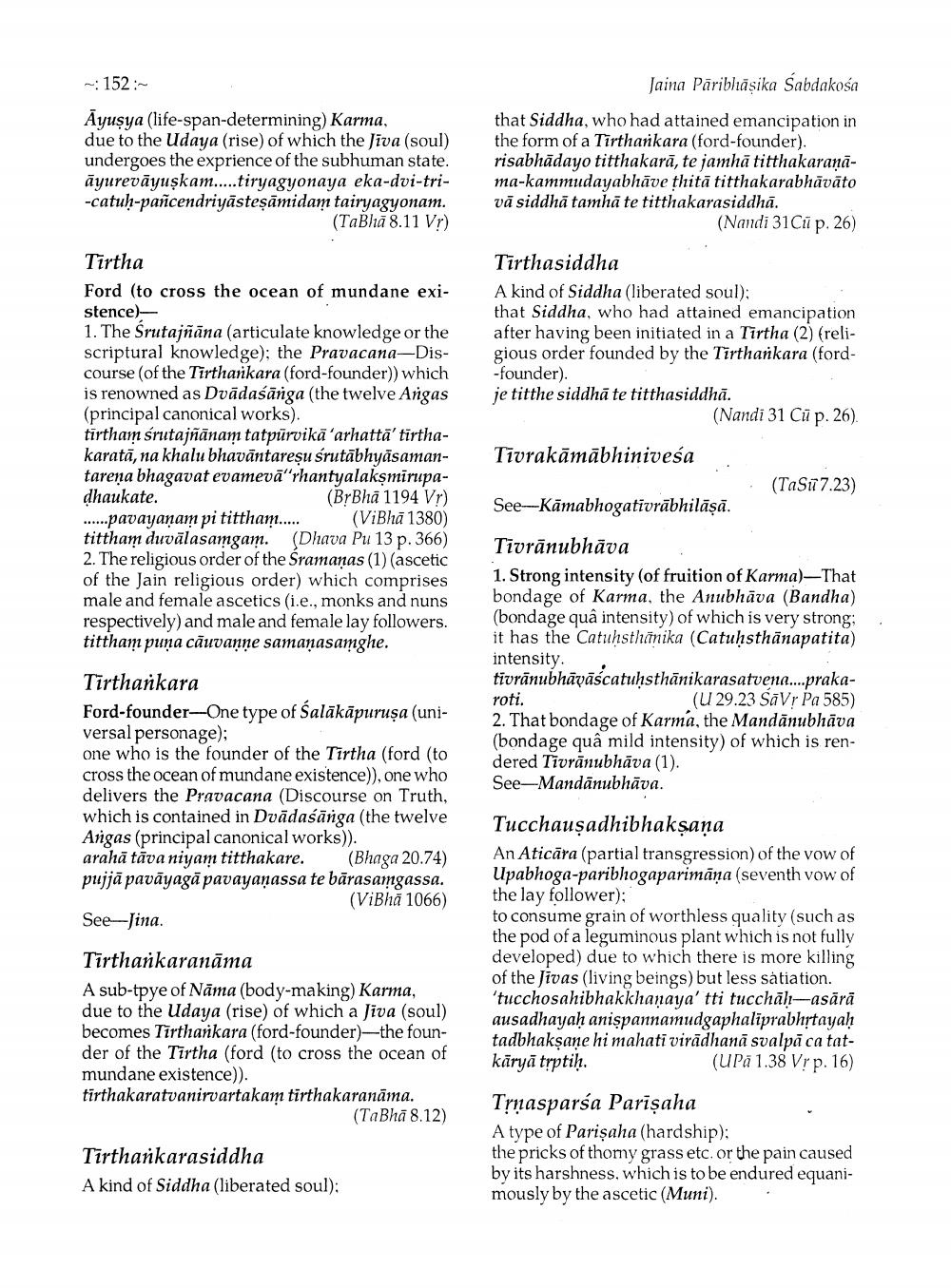________________
~152~
Ayuṣya (life-span-determining) Karma, due to the Udaya (rise) of which the Jiva (soul) undergoes the exprience of the subhuman state. ayurevayuskam.....tiryagyonaya eka-dvi-tri-catuḥ-pañcendriyästeṣamidam tairyagyonam. (TaBhā 8.11 Vr)
Tirtha
Ford (to cross the ocean of mundane existence)
1. The Srutajñāna (articulate knowledge or the scriptural knowledge); the Pravacana-Discourse (of the Tirthankara (ford-founder)) which is renowned as Dvadasanga (the twelve Angas (principal canonical works).
tirtham śrutajñānam tatpūrvikā 'arhatta' tirthakarata, na khalu bhaväntareşu śrutabhyasamantarena bhagavat evameva"rhantyalakṣmirupadhaukate. (BrBha 1194 Vr) ...pavayanam pi tittham...... (ViBh1380) tittham duvalasangam. (Dhava Pu 13 p. 366) 2. The religious order of the Sramaņas (1) (ascetic of the Jain religious order) which comprises male and female ascetics (i.e., monks and nuns respectively) and male and female lay followers. tittham puna cauvaṇne samaṇasanghe.
Tirthankara
Ford-founder-One type of Śalakāpuruşa (universal personage);
one who is the founder of the Tirtha (ford (to cross the ocean of mundane existence)), one who delivers the Pravacana (Discourse on Truth, which is contained in Dvadasanga (the twelve Aigas (principal canonical works)).
arahā tāva niyam titthakare. (Bhaga 20.74) pujjā pavāyagā pavayaṇassa te bārasamgassa. (Vibha 1066)
See-Jina.
Tirthankaranama
A sub-tpye of Nama (body-making) Karma, due to the Udaya (rise) of which a Jiva (soul) becomes Tirthankara (ford-founder)-the founder of the Tirtha (ford (to cross the ocean of mundane existence)). tirthakaratvanirvartakam tirthakaranāma.
(TaBha 8.12)
Tirthankarasiddha
A kind of Siddha (liberated soul):
Jaina Päriblasika Sabdakosa that Siddha, who had attained emancipation in the form of a Tirthankara (ford-founder). risabhadayo titthakarā, te jamhä titthakaraṇama-kammudayabhave thita titthakarabhāvāto vā siddha tamhā te titthakarasiddha. (Nandi 31Cap. 26)
Tirthasiddha
A kind of Siddha (liberated soul);
that Siddha, who had attained emancipation after having been initiated in a Tirtha (2) (religious order founded by the Tirthankara (ford-founder).
je titthe siddha te titthasiddhā.
Tivrakāmābhiniveśa
(Nandi 31 Cu p. 26).
See-Kamabhogativrăbhilāṣā.
(TaSu 7.23)
Tivranubhava
1. Strong intensity (of fruition of Karma)-That bondage of Karma. the Anubhava (Bandha) (bondage quâ intensity) of which is very strong: it has the Catuḥsthanika (Catuḥsthänapatita) intensity.
roti.
tivranubhāvāścatuḥsthānikarasatvena....praka(U 29.23 Savr Pa 585) 2. That bondage of Karma, the Mandanubhava (bondage quá mild intensity) of which is rendered Tivranubhava (1). See-Mandanubhāva.
Tucchausadhibhakṣaṇa
An Aticara (partial transgression) of the vow of Upabhoga-paribhogaparimana (seventh vow of the lay follower):
to consume grain of worthless quality (such as the pod of a leguminous plant which is not fully developed) due to which there is more killing of the Jivas (living beings) but less satiation. 'tucchosahibhakkhanaya' tti tucchal-asarā ausadhayaḥ anispannamudgaphaliprabhṛtayaḥ tadbhakṣane hi mahati viradhana svalpa ca tatkäryä trptiḥ. (UPa 1.38 Vrp. 16)
Trasparśa Parişaha
A type of Parisaha (hardship):
the pricks of thomy grass etc. or the pain caused by its harshness, which is to be endured equanimously by the ascetic (Muni).




